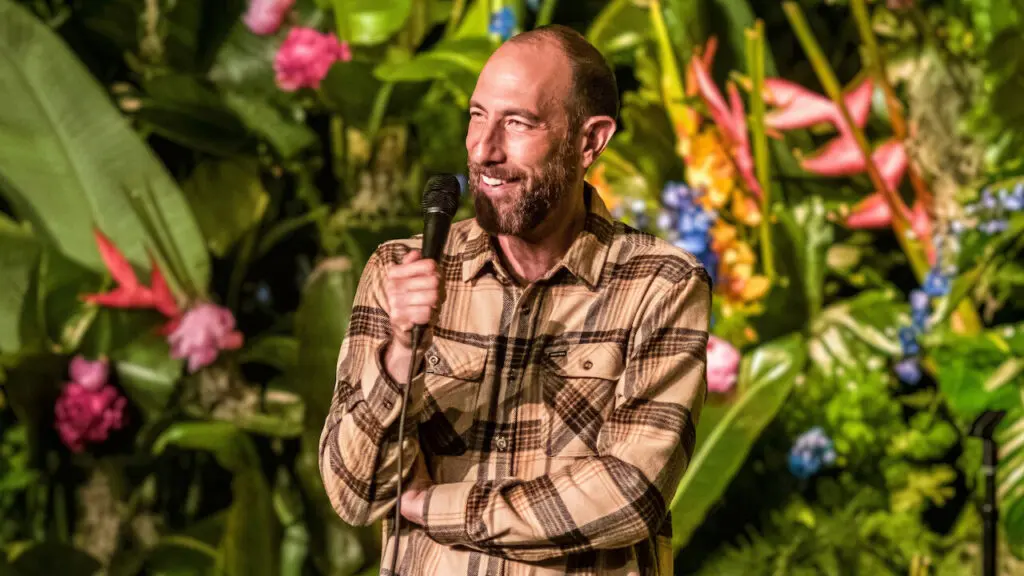Summary
Ari Shaffir riffs on a variety of subjects in America’s Sweetheart and finds a unifying theme to tie everything together. It’s nothing special, but it does the job.
From a stage festooned with live plants for no real reason that I can discern, Ari Shaffir delivers his second Netflix special (fifth overall), America’s Sweetheart, from the Capital Turnaround in Washington, D.C. It’s laidback enough that you can forget some of the controversies and blunders that tend to swirl around the comic, who uses the hour to find the positive side of various topics that seem not to have one, from 9/11 and Kanye West’s antisemitism to school shootings and, eventually, the Holocaust.
In many ways, Shaffir is the moral and performative opposite of someone like Gabriel Iglesias, whose latest Netflix special brought in the still-young year. There’s a feeling of whiplash in going from one to the other. All the stuff that Iglesias wouldn’t talk about is mentioned one after the other by Shaffir, who reels through a litany of risky subjects like he’s trying to fill a quota.
This is the point, though. Despite the subject choices, America’s Sweetheart isn’t trying to be especially offensive or edgy. The underlying theme of everything having a silver lining just ends up being an excuse to riff, usually harmlessly, on the topics people tend to avoid out of fear. Everything’s treated the same: “This is a bad thing, but…”
It’s a decent way to frame the jokes. There’s an absurdist quality to it, a ring of – perhaps uncomfortable – truth, and it’s a good excuse to touch on a lot of different areas in a way that doesn’t feel overly scattershot. This is the first release of a two-special deal Shaffir has struck with Netflix and should provide an interesting counterpoint to the next one, a re-release of his 2022 YouTube special, Jew.
They wouldn’t admit it, but most people probably have continued to enjoy Kanye’s music despite his abhorrent personal politics; most people do pretend to care much more than they really do about a whole host of stuff they’ve never taken an interest in before, perhaps most especially women’s college-level swimming, and most people don’t work themselves up into a frenzy about the latest inevitably temporary scandal or cultural trend.
There’s an odd reassuring quality to America’s Sweetheart. It’s a reminder that most things are fine. Good, even. The vast majority of people aren’t that worried or upset about the majority of things they claim to be outraged about; mainstream news cycles and social media echo chambers are just designed to make you think they are.
Some stuff’s deliberately absurd (but he was also in the writers’ room for the unimpressive Sausage Party: Foodtopia), like a bit about how racial profiling makes it easier for white people to steal. There’s an extended Down syndrome sequence that’s a little too similar to Shane Gillis’s material on the subject in Live in Austin and Beautiful Dogs, and there’s a relatively flippant trans bit that people won’t like because they never do. But most of Shaffir’s material here is just playful and relaxed, even his shots at other comics (Jimmy Fallon gets quite a brutal put-down, but Joe Rogan only gets a vaccine jab, and Chappelle gets a light ribbing for recycling the same material several specials in a row.)
The closing bit about Shaffir asking his Holocaust survivor grandfather if some days in the concentration camp were better than others isn’t terribly funny but works as a culmination of the theme, the ultimate test of a positive mental attitude, and for a comic known primarily for being extremely callous, the closing credits, which include full paragraphs of nice compliments and references for individual members of the production crew, are put to surprisingly great use.
I’m sure there will be some backlash from certain largely predictable quarters, despite the fairly soft-touch material, and I’m similarly sure there will be plenty who don’t feel Shaffir goes far enough, which puts America’s Sweetheart in an interesting position. But it’s mostly just fine, which is fair enough.




